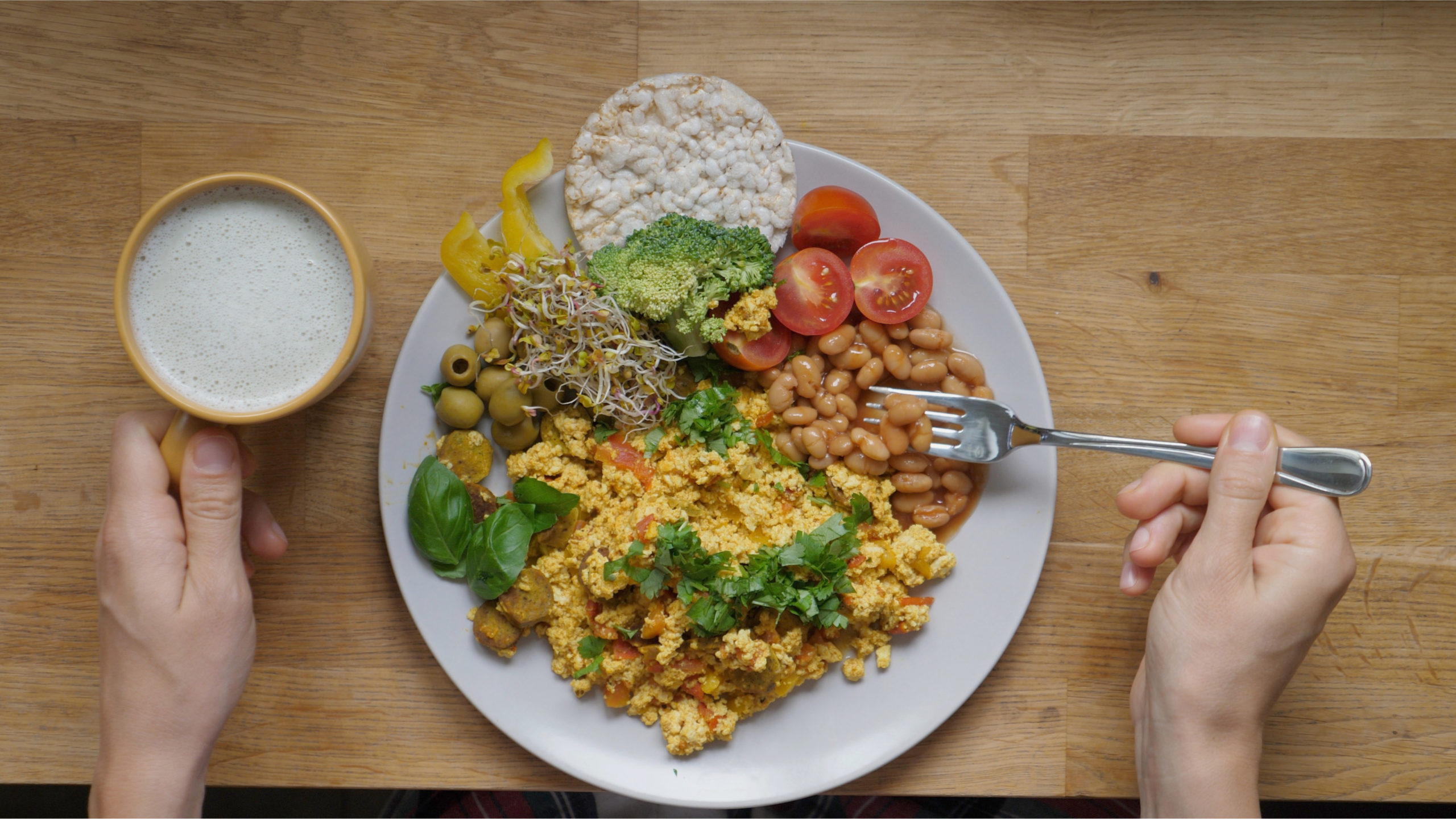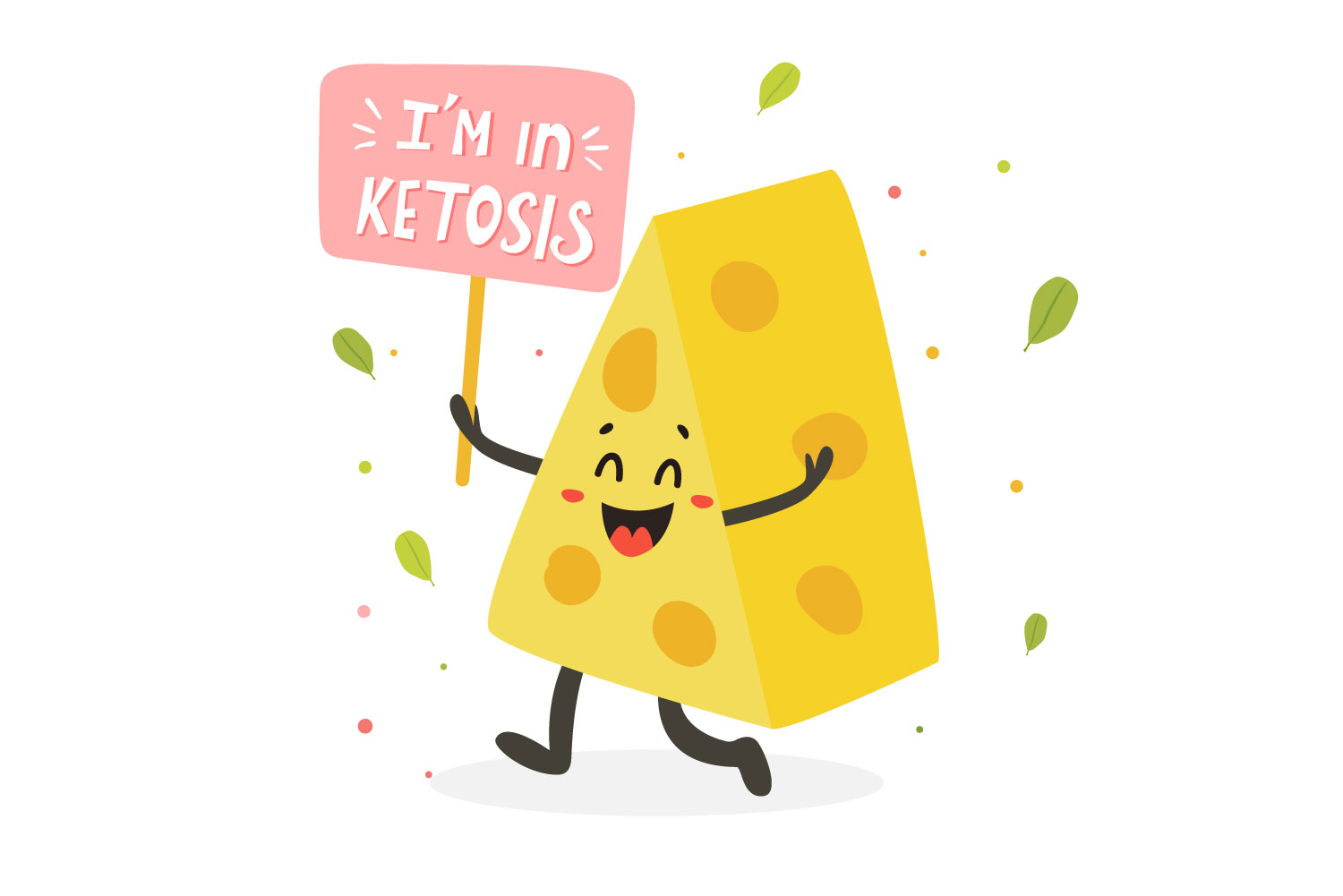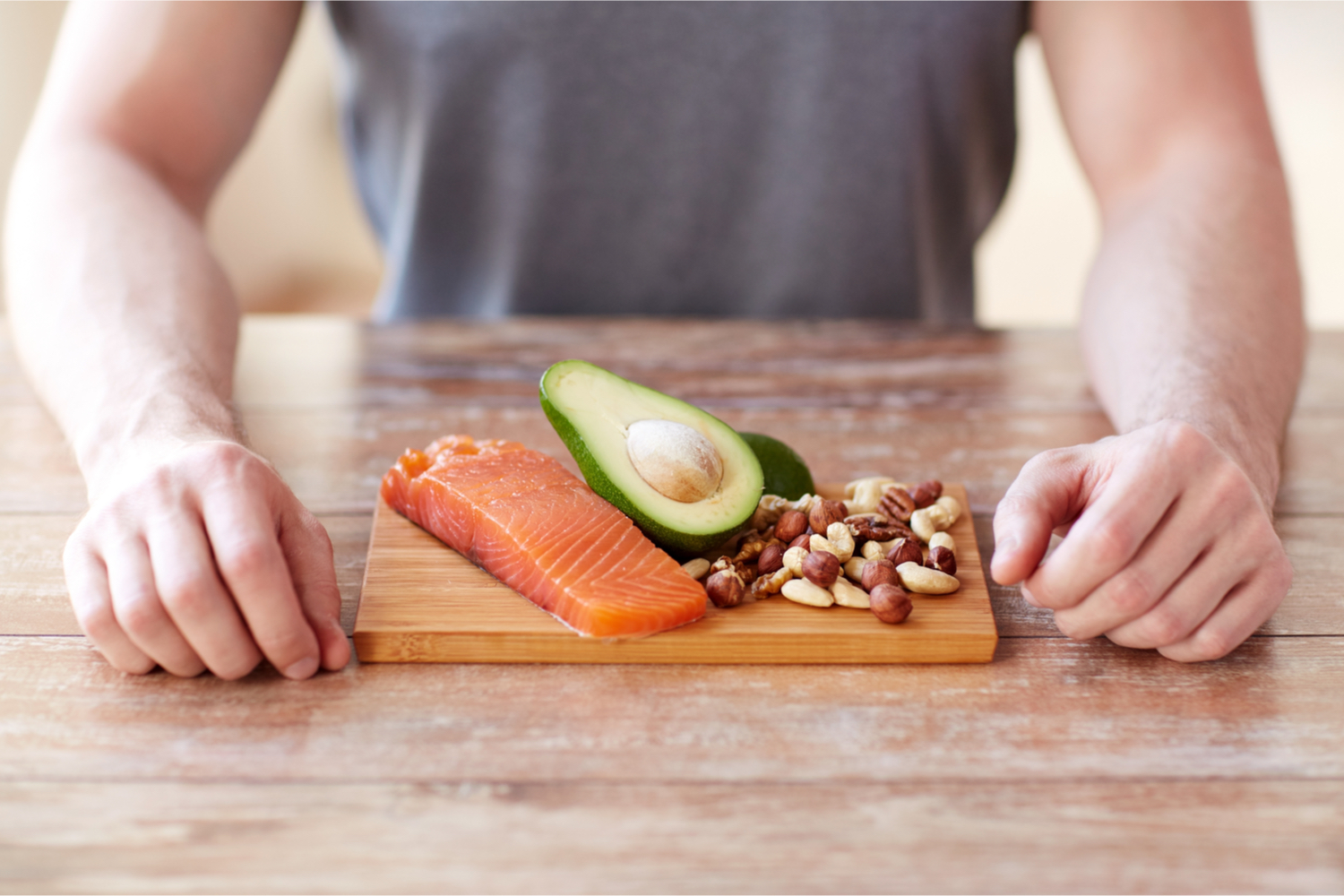SUMMARY
Many people assume a vegan diet is low in protein. However, there are many vegan protein sources provide this vital nutrient. The list of high-protein vegan foods includes choices like tofu, nut butter and lentils.
Protein is an integral part of a healthy eating plan – your body needs it to build muscle and repair cells.
Most people know that protein is in animal products like beef and fish. But there is a widespread belief that getting your protein needs met is challenging if you follow a vegan diet. A vegan eating plan is a plant-based diet that excludes all animal products.
So, is getting adequate protein difficult on a vegan diet? Fortunately, the answer to that question is no. Animal protein isn’t your only option if you want to add more of this nutrient to your eating plan. If you’re a vegan, many plant foods can help you meet the recommended daily protein requirement.
Let’s take a look at some critical vegan protein sources.
In this article, we will:
- Explain what a vegan protein source is
- List some of the best vegan protein sources
- Share recommendations that detail how much protein you should get each day
What are vegan protein sources?
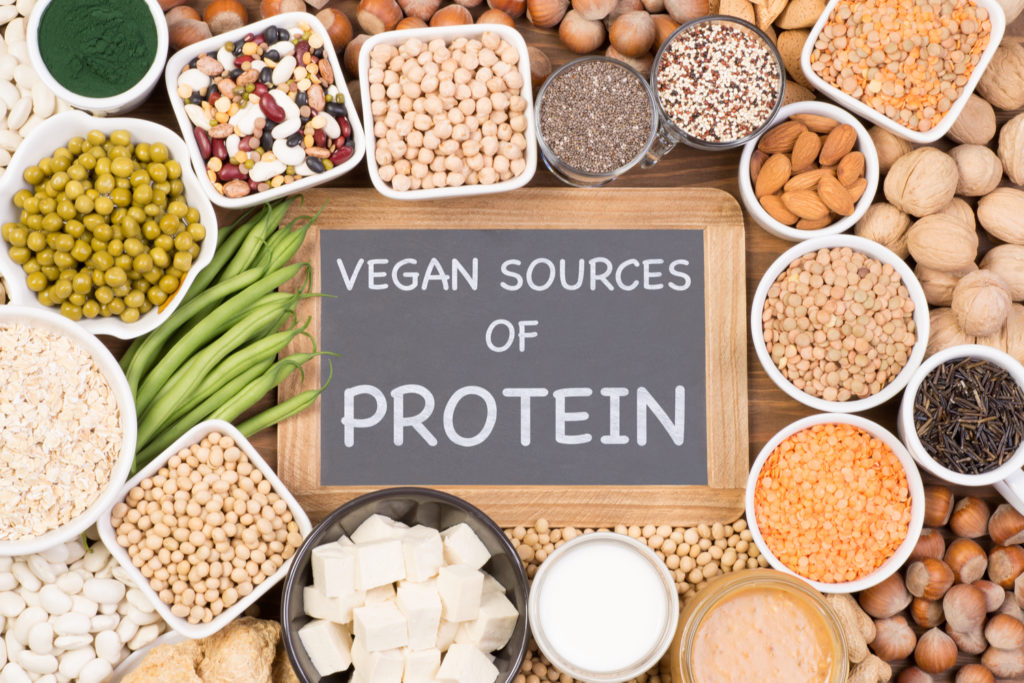
Typically, vegan protein sources are plant-based foods that contain protein. As mentioned, the vegan diet excludes all foods made with animal products. That means that vegan protein sources are free of animal-based ingredients.
Many plant-based foods contain at least some protein. But some of these foods are richer sources of this essential macronutrient than others. These high-protein vegan foods can be a vital resource if you want to maximize the amount of protein in your diet.
It’s also helpful to have insight regarding complete proteins. A complete protein contains sufficient amounts of each essential amino acid, and there are nine of these essential acids in total.
Some plant-based foods contain complete protein. For example, Ezekiel bread — a bread made with sprouted grains — is a source of complete protein and has all the essential amino acids. In addition, tofu, tempeh, buckwheat and quinoa provide complete protein for your plant-based diet.
You can also create complete protein by mixing different vegan protein sources. For example, combining rice with a bean such as kidney bean or chickpea will provide you with a source of complete protein.
High-protein vegan foods: Best vegan protein sources
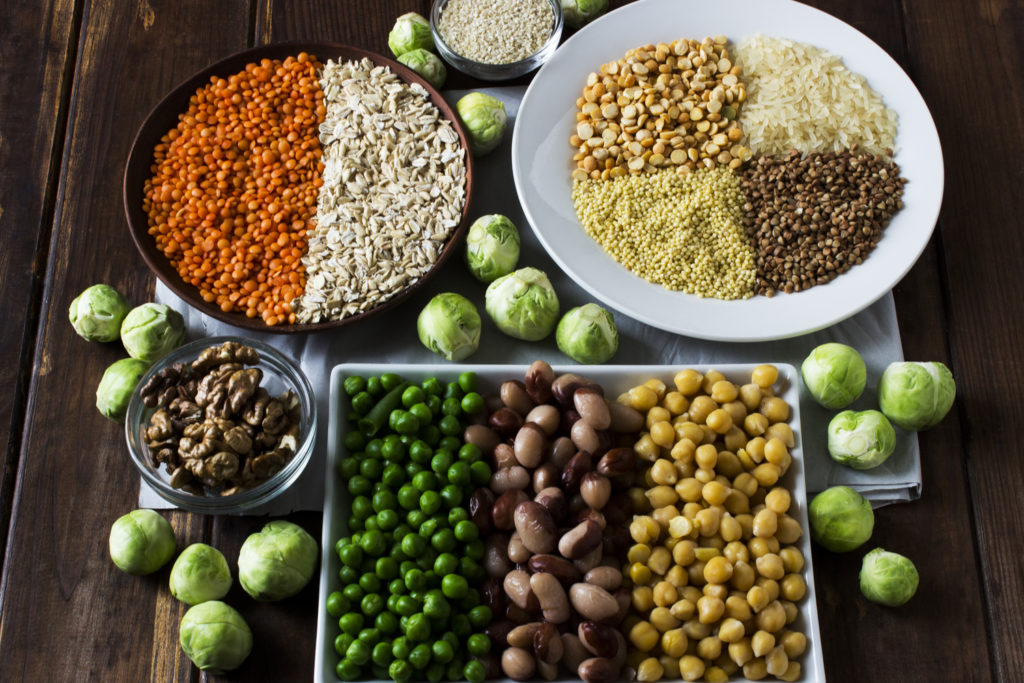
You have lots of tasty and nutritious options to consider if you’re looking to boost the protein content of your diet using plant-based foods.
The menu items listed below are some of the best vegan protein sources. We’ve included the amount of protein each vegan food contains per serving.
Our picks are in descending order, and our information comes from the USDA Food Data Central Repository.
Vegan protein sources with more than 20 grams of protein per serving
This list includes everything from vegan protein powder to lupin, a bean loaded with plant protein. It also features soy foods like tempeh and tofu — as mentioned, both these menu items provide complete protein.
- Firm tofu – 43.5 grams per cup
- Soybeans (edamame; boiled) – 31.3 grams per cup
- Tempeh – 31 grams per cup
- Oats (uncooked) – 26.3 grams per cup
- Lupin beans (cooked) – 25.8 grams per cup
- Soy-based protein powder – 25 grams per scoop
- Buckwheat (uncooked) – 22.5 grams per cup
- Green soybeans (cooked) – 22.2 grams per cup
Vegan protein sources with 20 to 10 grams of protein per serving
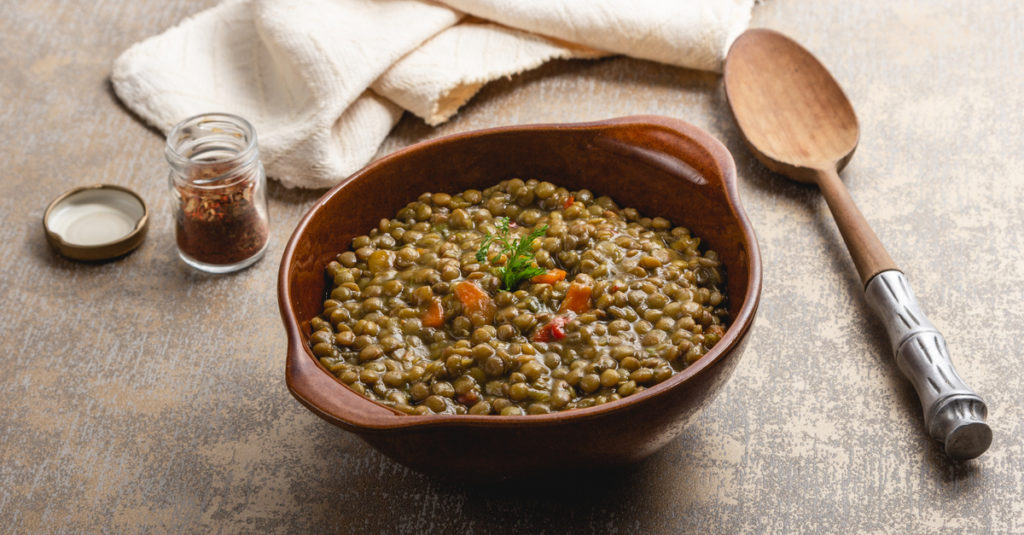
The lineup here includes the lentil, a tasty legume that’s often the star of the show in Indian cuisine. You’ll also find soy milk, a popular soy protein.
- Navy beans (canned) – 19.7 grams per cup
- Lentils (cooked) – 17.9 grams per cup
- Large white beans (cooked) – 17.4 grams per cup
- Adzuki beans – 17.3 grams per cup
- Roman beans (cranberry beans) – 16.5 grams per cup
- Oat bran – 16.3 grams per cup
- Split peas – 16.3 grams per cup
- Pinto beans (cooked) – 15.4 grams per cup
- Kidney beans – 15.3 grams per cup
- Black beans – 15.2 grams per cup
- Black turtle beans – 15.1 grams
- Great Northern beans – 14.7 grams
- Lima beans – 14.7 grams
- Chickpeas (garbanzo beans) – 14.5 grams per cup
- Mung beans (cooked) – 14.2 grams per cup
- Soy milk – 14 grams per 16-ounce glass
- Catjang beans (cooked) – 13.9 grams per cup
- Black-eyed peas (cowpeas) – 13.2 grams per cup
- Soybean sprouts – 13.1 grams per 100 grams
- Broad beans (fava beans) – 12.9 grams per cup
- Soybeans (dry-roasted) – 12.1 grams per cup
- Spelt (cooked) – 10.7 grams per cup
- Pea sprouts – 10.6 grams per cup
- Whole-grain sorghum flour – 10.2 grams per cup
Vegan protein sources with less than 10 and more than 5 grams of protein
This portion of our roundup includes seeds such as hemp seed and flax seeds. It also includes nuts like cashews and almonds.
- Cornmeal (uncooked) – 9.9 grams per cup
- Kamut (cooked) – 9.8 grams per cup
- Teff (cooked) – 9.8 grams per cup
- Succotash – 9.7 grams per cup
- Amaranth (cooked) – 9.3 grams per cup
- Soybean sprouts – 9.2 grams per cup
- Hemp seed – 9 grams per ounce
- Lentil sprouts (cooked) – 8.8 grams per cup
- Pumpkin seeds – 8.6 grams per ounce
- Soft tofu – 8.6 grams per piece (2.5 inches x 2.75 inches x 1 inch)
- Quinoa (cooked) – 8.1 grams per cup
- Nutritional yeast — 8 grams in 2 tablespoons
- Green peas – 7.9 grams per cup
- Peanut butter – 7.7 grams in 2 tablespoons
- Peanuts – 7.3 grams per ounce
- Straw mushrooms (canned) – 7 grams per cup
- Wild rice (cooked) – 6.5 grams per cup
- Millet (cooked) – 6.1 grams per cup
- Almonds – 6 grams per ounce
- Pistachio nuts – 6 grams per ounce
- Sunflower seeds – 5.8 grams per ounce
- Spirulina – 5.9 grams per 100 grams
- Tahitian taro (cooked) – 5.7 grams per cup
- Podded peas (cooked) – 5.6 grams per cup
- Spinach (cooked) – 5.3 grams per cup
- Snow peas (cooked) – 5.2 grams per cup
- Cashews – 5.2 grams per ounce
- Flax seeds – 5.2 grams per ounce
- Artichokes (cooked) – 5.2 grams per cup
- Asparagus (canned) – 5.2 grams per cup
- Passion fruit – 5.2 grams per cup
- Sugar apples – 5.2 grams per cup
- Tahini (raw sesame butter) – 5.1 grams per ounce
- Hubbard squash (cooked) – 5.1 grams per cup
- Arrowroot – 5.1 grams per cup (sliced)
- Collards (cooked) – 5.1 grams per cup
Vegan protein sources with 5 to 3 grams of protein
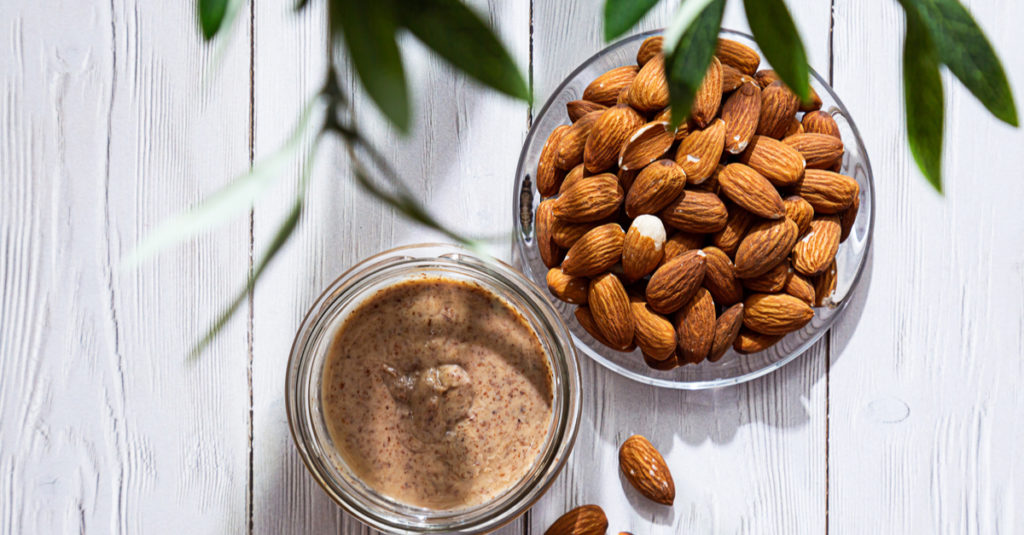
You’ll find nut butter made with plant foods like almonds and cashews on this list. You’ll also find Ezekiel bread — a complete protein.
- Cashew butter – 5 grams per ounce
- Sweet potatoes (mashed) – 5 grams per cup
- Yellow sweet corn – 4.7 grams per cup
- Chia seed — 4.7 grams per ounce
- Jujube (dried) – 4.7 grams per cup
- Coconut milk – 4.6 grams per cup
- Russet potatoes (baked) – 4.6 grams per medium potato
- Brown rice (cooked) – 4.5 grams per cup
- White rice (cooked) – 4.3 grams per cup
- Walnuts – 4.3 grams per ounce
- Guavas – 4.2 grams per cup
- Hazelnuts – 4.2 grams per ounce
- Brazil nuts – 4.1 grams per ounce
- Portobello mushrooms – 4 grams per cup
- Brussels sprouts (cooked) – 4 grams per cup
- Ezekiel bread — 4 grams per slice
- Avocados – 4 grams per cup
- Goji berries (dried) – 4 grams in 5 tablespoons
- Pine nuts – 3.9 grams per cup
- White button mushrooms (stir-fried) – 3.9 grams per cup
- Bamboo shoots – 3.9 grams per cup
- Kale (cooked) – 3.8 grams per cup
- Palm hearts (canned) – 3.7 grams per cup
- Beet greens (cooked) – 3.7 grams per cup
- Broccoli (cooked) – 3.7 grams per cup
- Durian – 3.6 grams per cup
- Almond butter – 3.4 grams per tablespoon
- Swiss chard (cooked) – 3.3 grams per cup
- Pili nuts – 3.1 grams per ounce
- Okra (cooked) – 3 grams per cup
- Kohlrabi (cooked) – 3 grams per cup
Vegan protein sources with less than 3 grams of protein per serving
Certain mushrooms are great vegan protein foods. This list includes choices like oyster mushrooms and cremini mushrooms.
- Onions (cooked) – 2.9 grams per cup
- Cassava – 2.8 grams per cup
- Oyster mushrooms – 2.8 grams per cup
- Bok choy (cooked) – 2.7 grams per cup
- Green cauliflower (cooked) – 2.7 grams in ⅕ head
- Pecans – 2.6 grams per ounce
- Tomatoes (cooked) – 2.3 grams per cup
- Shiitake mushrooms (cooked) – 2.3 grams per cup
- Red cabbage (cooked) – 2.3 grams per cup
- White cauliflower (cooked) – 2.3 grams per cup
- Macadamia nuts – 2.2 grams per ounce
- Cremini mushrooms – 2.2 grams per cup
- Zucchini (cooked) – 2.1 grams per cup
- Yam (cooked) – 2 grams per cup
- Coconut water – 1.7 grams per cup
- Tamari – 1.9 grams per tablespoon
- Soy sauce – 1.3 grams per tablespoon
How much protein should you get each day?

The Recommended Dietary Allowance (RDA) for protein is just 0.8 grams of protein per kilogram of body weight. That translates to 0.36 grams per pound. So, a person weighing 140 pounds would need 50 grams of protein under this guideline.
Keep in mind, though, that the RDA is merely the minimum amount of protein needed to meet your body’s most basic requirements. It’s the amount of protein your body requires to prevent you from experiencing protein deficiency. For optimal health, you’ll likely need to consume more than this minimum amount each day.
And if you’re part of a group that needs extra protein for any reason, you’ll need to consume much more than this minimum to get what your body needs. For example, bodybuilders need ample protein to create bigger, stronger muscles. And since muscle mass often diminishes as we age, the AARP states that older people often need to increase protein intake to maintain a healthy amount of lean muscle.
At the other end of the spectrum, getting too much protein is certainly possible. Excessive protein can lead to health problems such as kidney stones.
Currently, it’s recommended that you limit your protein intake to no more than 2 grams per kilogram of body weight. That translates to a maximum of 125 grams per day for a person who tips the scales at 140 pounds.
Next steps
Take a convenient approach to healthy nutrition by subscribing to Fresh N Lean. Our list of meal plans includes everything from vegan to high-protein choices. We deliver our chef-prepared meals to your home or office, making them with organic ingredients.
Fresh N Lean is the nation’s largest organic meal delivery service. Our tasty, chef-prepared cuisine is always fresh and never frozen, and we offer convenient meal plans like Protein+, Keto, Paleo, Standard Vegan and Mediterranean. Choose Fresh N Lean for affordable nutrition, delivered to your doorstep.
